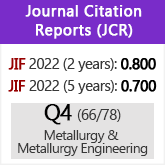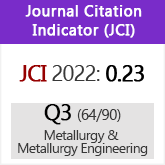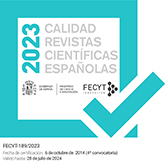Thermal interaction coating-substrate in high velocity oxyfuel (HVOF) spraying of WG-Go powder particles
DOI:
https://doi.org/10.3989/revmetalm.1995.v31.i3.962Keywords:
HVOF spraying, Mathematical simulation, Heat transfer, Solidification, Optimal conditionsAbstract
The mathematical simulation of the thermal interaction between a 34CrMo4 (UNS-G41350) steel substrate and a coating formed by the droplets of WC-12 % Co powder particles during HVOF spraying is undertaken. Analysis of the heat transfer processes permitted the investigation of the temperature evolution, coating solidification, substrate fusion and solidification, particular features of the thermal interactions between the substrate and the coating as well as between the successive coating layers. The analysis has also permitted to estimate the optimal conditions of the substrate and the coating structure formation. The obtained results were used in subsequent articles to predict the structure parameters, which agree with the experimental data.
Downloads
Download data is not yet available.
Downloads
Published
1995-06-30
How to Cite
Sobolev, V. V., Guilemany, J. M., & Calero, J. A. (1995). Thermal interaction coating-substrate in high velocity oxyfuel (HVOF) spraying of WG-Go powder particles. Revista De Metalurgia, 31(3), 156–165. https://doi.org/10.3989/revmetalm.1995.v31.i3.962
Issue
Section
Articles
License
Copyright (c) 1995 Consejo Superior de Investigaciones Científicas (CSIC)

This work is licensed under a Creative Commons Attribution 4.0 International License.
© CSIC. Manuscripts published in both the printed and online versions of this Journal are the property of Consejo Superior de Investigaciones Científicas, and quoting this source is a requirement for any partial or full reproduction.All contents of this electronic edition, except where otherwise noted, are distributed under a “Creative Commons Attribution 4.0 International” (CC BY 4.0) License. You may read here the basic information and the legal text of the license. The indication of the CC BY 4.0 License must be expressly stated in this way when necessary.
Self-archiving in repositories, personal webpages or similar, of any version other than the published by the Editor, is not allowed.

















